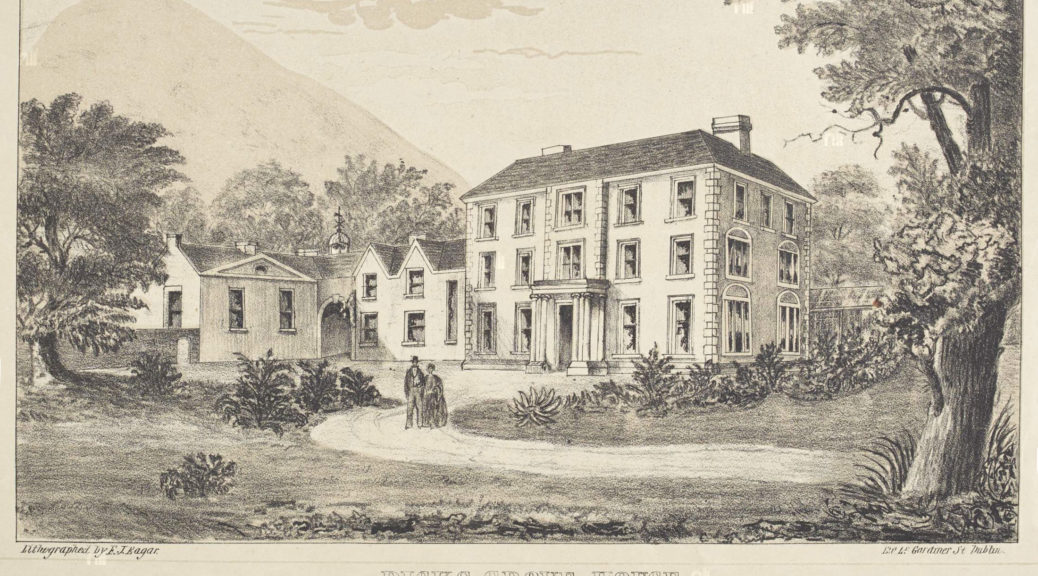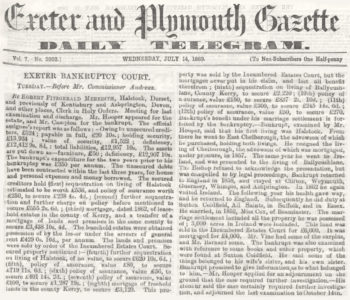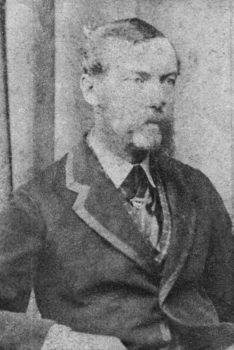
My stepmother Margo’s Mum was affectionately known as “Batty Nan” by her grandsons (Tony & Mike). Rose Fitzgerald Meredith had a colorful family on her mother’s side, but until a week or so ago, I didn’t know much about the colorful characters on her father’s side of the family.
Rose’s father, William Thomas Meredith, born in 1847 in Armagh, Ireland, was the oldest child of Manus Blake Meredith, an engineer, and his wife Anne. Dicks Grove House, above, where Manus grew up, was the Kerry Merediths’ family home.
William Thomas was cared for by various relatives for reasons I don’t know, beyond the fact that his father Manus died when he was only 9. At age four (1851 census) – while his father was still alive – he lived with his uncle, The Rev. Robert Fitzgerald, a 35-year-old bachelor, and the Reverend’s sister, Marian Maria Meredith, 38. Rev. RF Meredith was the rector in Lewcombe, Dorset.
There’s more to tell (below) about the very un-vicar-like life of the reverend, but for young William, he was on the move pretty quickly – his uncle married Mary Russell Cox in 1852, and their first child was born in 1854 (first of eight with this wife). By the 1861 census, William is still with his aunt Marian Meredith but in Sherborne, Dorset and his younger sister Alicia has joined them – both are listed as “Scholar”. There’s also a 34 year old nephew, William Edward Meredith, son of Marian’s older brother Richard.
 The Meredith family tree is huge and complicated. There’s a great site, The Irish Merediths, that has most of the family covered, but I hope this adaptation of Ancestry’s family group helps connect the parts of the family covered in this story. Rose’s father, two uncles and an aunt were children of William Meredith (i.e. William Thomas Meredith’s grandfather – the naming keeps you on your toes!)
The Meredith family tree is huge and complicated. There’s a great site, The Irish Merediths, that has most of the family covered, but I hope this adaptation of Ancestry’s family group helps connect the parts of the family covered in this story. Rose’s father, two uncles and an aunt were children of William Meredith (i.e. William Thomas Meredith’s grandfather – the naming keeps you on your toes!)
It’s a puzzle that young William’s mother, Anne (née Casebourne) isn’t with her (five) children after her husband Manus dies in 1856. In 1861, she’s a 36-year-old “companion” for her 60-year-old sister-in-law Rose Helen – Manus’ oldest brother Richard’s widow, but she only has one of her children (Richard H Meredith, then age 9) with her.
William’s younger sister Rose Helen is living in Durham as a boarder with a Solicitor and several unmarried sisters who are schoolmistresses or governesses running the West House School. 11-year-old Rose Helen Meredith appears to be the only scholar with three teachers, a governess, three servants and two maiden aunts! Staff to pupil ratio is off the charts. The solicitor is the one who later drew up William’s articles of clerkship in 1869, Thomas P Brunton – there’s obviously some family or business connection there.
Marian Maria Meredith never married, which was probably good news for her various nieces and nephews who needed a home – another example of aunts and grandparents to the rescue. By the 1871 census, Rose’s father is still living with his aunt, but in West Hartlepool, Durham, and at 24, he is a solicitor’s articled clerk. His sister Alicia, now a teacher, lives with them, and Charles C Meredith, another 15-year-old nephew, has joined the household.
Ten years later, in 1881, it’s just Aunt Marian and William, now 34 and a Solicitor’s Managing Clerk, but they’ve moved to Wells St. Cuthbert in Somerset. In 1881, his future wife, Mary Sophie D’Ouseley is living with her mother, Mary, in Bath – about 30 minutes away by car and 2 hours by bicycle (according to Google). I wish I could identify some way their paths crossed that led to the Solicitor’s Clerk, 43, marrying the watercolor painter, 36, in 1890 (in Northfleet, Kent).
While researching Batty Nan’s grandfather, Manus Blake Meredith, I came upon a mention of his brother, Rev Robert Fitzgerald Meredith’s, bankruptcy which sounded so extreme I had to search newspaper archives to see what I could find. What sounded like an intriguing story to me, had been a hugely interesting story at the time, as newspapers across the UK ran stories about the bankrupt cleric – Penrith, Stroud, Manchester, London, Newry, Worcester, Glasgow, Bristol, Birmingham, Dublin, Gloucester, Dover, Edinburgh, Cardiff, Liverpool, Salisbury, Newcastle and many more.
I have an image of an English country vicar, based on some I encountered as a child as well as stories I read, as a person living a life of pastoral care for his parishioners. The stories I read about the Rev Robert Fitzgerald Meredith, even before his horrible year in 1869, were vastly different – where parishes and their income were collected like trading shares and traveling to Ireland regularly to deal with lawsuits or tenant issues with land he had there would seem to preclude spending much time with the locals in Halstock should they have needed him.
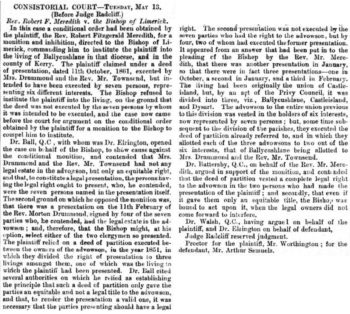
In 1854, for example, there’s an announcement in a Dublin paper of a list of people looking for public loans for land improvements, and Rev Meredith is seeking one for his lands in Inchincommer and Bawnaglanna. In 1862, he sued the Bishop of Limerick seeking to be appointed to a parish he believed he was owed – I had to look up advowson: the right to recommend a member of the Anglican clergy for a vacant benefice, or to make such an appointment. It’s not clear to me who looks after parishioner issues if the vicar is just collecting his money and resides elsewhere – the wrangling is all about the transactions, not welfare of the flock.
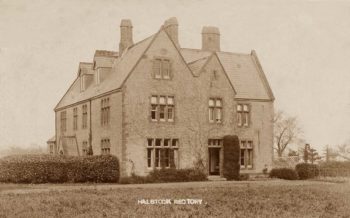
In the 1861 census, the Reverend is in Ashprington, Devon as curate. In 1867, the Bishop of Rochester licensed him to Stapleford Tawney (north of Romford, Essex) and in 1871 he is in the Parsonage in Halstock. In 1868, his first wife died and in 1869, his financial shenanigans come back to haunt him and he declares bankruptcy. The scale of his financial problems are detailed in the following newspaper article, but for perspective, in 2018 terms, his liabilities exceeded his assets by £1,500,000! Everything that looked like an asset was mortgaged to the hilt or belonged to someone else. A report in May 1869 in the Western Daily Press said that the furniture in his house was borrowed from a Mr. Corbett in Deptford as the sheriff’s officers found out when they went to take possession of the furniture on behalf of one of his large creditors.
Meredith had apparently been dodging his creditors for years. in the Pall Mall Gazette reporting of the July 1869 hearings, it mentioned that in 1857 he had fled to London when a mortgagee of one of his assets threatened him with imprisonment. Meredith complained that he had lived in Clifton and London with nothing to do and expenses of £1 a day, leading to his financial difficulties (math clearly was not his strong suit as you don’t get to £1.5 million via a few years at £1 a day).
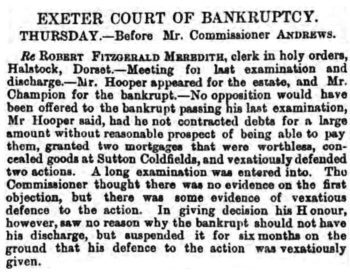
In November, the judge rejected the creditors’ claims that Meredith had taken on debts with no intention of paying it back and had been concealing goods but agreed that he had vexatiously defended two lawsuits against him. His discharge from bankruptcy was suspended for 6 months- essentially for bad behavior. You’d think he would have learned his lesson, but in 1881 there’s a newspaper report of him being sued for payment on some books he ordered and didn’t pay for. He’d acknowledged he debt and promised to pay in a letter, but then didn’t. I think he deserved the “Batty Vicar” title at least as much as Rose earned “Batty Nan”!

